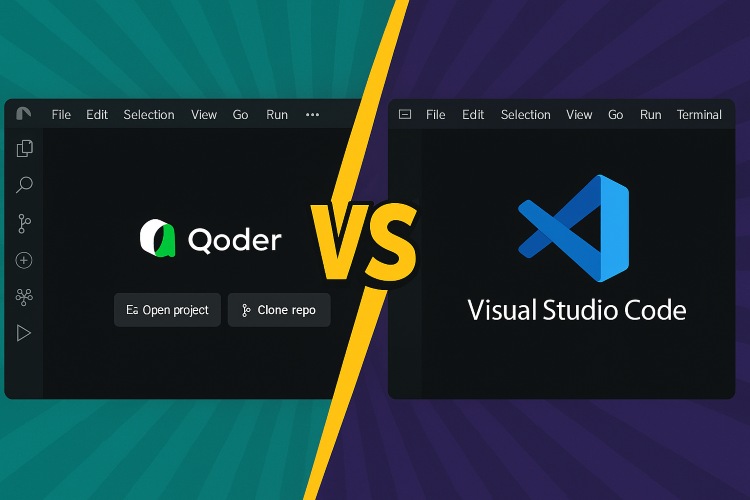AI Navigation
- articleAI Trends
- lightbulb_2AI Tips
- assistant_navigationAI Navigation
- heatHot Articles
- emergency_heat_2Hot Tips
- format_list_numberedPrompt Formatter
- psychologyTest Center(RPI)
Qoder Review: How Alibaba’s Agentic Coding Platform Differs from VS Code
When it comes to IDEs, Visual Studio Code (VS Code) has become the world’s most popular development tool. With its open-source foundation, cross-platform support, and massive plugin ecosystem, it dominates developers’ desktops worldwide.
Recently, Alibaba introduced Qoder, branding it as an Agentic Coding Platform — an AI-driven IDE designed to enhance developer productivity.
But how exactly does Qoder differ from VS Code? Let’s break it down.

(1) Technical Foundation
VS Code, developed by Microsoft, is fully open-source under the MIT License. Built on Electron and Node.js, it runs seamlessly on Windows, Mac, and Linux. Its biggest strengths lie in flexibility and a thriving extension ecosystem.
Qoder, however, is not a brand-new IDE. Instead, it is built on the open-source VS Code core, re-engineered with Alibaba’s AI Agentic features. Essentially, Qoder’s foundation is VS Code + Alibaba’s AI enhancements.
(2) Functional Positioning
VS Code is a lightweight, general-purpose IDE. Out of the box, it doesn’t provide AI features — developers need extensions like GitHub Copilot or Tabnine to enable smart coding support.
Qoder positions itself differently: it is AI-native. Features like intelligent code generation, automated refactoring, and context-aware debugging are integrated directly into the IDE, available without extra plugins. This makes Qoder more of a “next-generation AI IDE.”
(3) User Experience
Qoder’s interface looks almost identical to VS Code, meaning developers can adopt it instantly with zero learning curve. While this makes onboarding easy, it also raises questions about originality.
In terms of AI, Qoder delivers an out-of-the-box experience — just download and install, and the AI features are ready to go. By contrast, VS Code requires third-party extensions to provide similar capabilities.
Performance-wise, both rely on Electron, so startup speed and memory usage are largely similar. The key difference lies in the responsiveness and stability of Qoder’s AI-powered features.
(4) Ecosystem and Extensions
VS Code enjoys the world’s largest plugin marketplace, supporting virtually every language, framework, and workflow.
Qoder is theoretically compatible with VS Code extensions, but its own ecosystem is still uncertain. Over time, it’s expected to integrate more tightly with Alibaba Cloud and China’s domestic developer ecosystem, giving it unique advantages in those contexts.
(5) Target Users
VS Code is ideal for global developers who need cross-platform flexibility and rely on ecosystems like GitHub and Azure.
Qoder, on the other hand, is better suited for developers and enterprise teams within China, particularly those already using Alibaba Cloud. For those curious about the AI-native IDE experience, Qoder is worth trying.
Conclusion
The relationship between Qoder and VS Code can be seen as “same roots, different branches.”
-
VS Code remains the universal, community-driven IDE with the richest global plugin ecosystem.
-
Qoder is a domestically developed, AI-native IDE that aims to stand out in the new wave of AI-powered coding tools.
Whether Qoder can truly differentiate itself beyond its VS Code foundation will depend on how well it refines its AI features and builds a sustainable developer ecosystem.